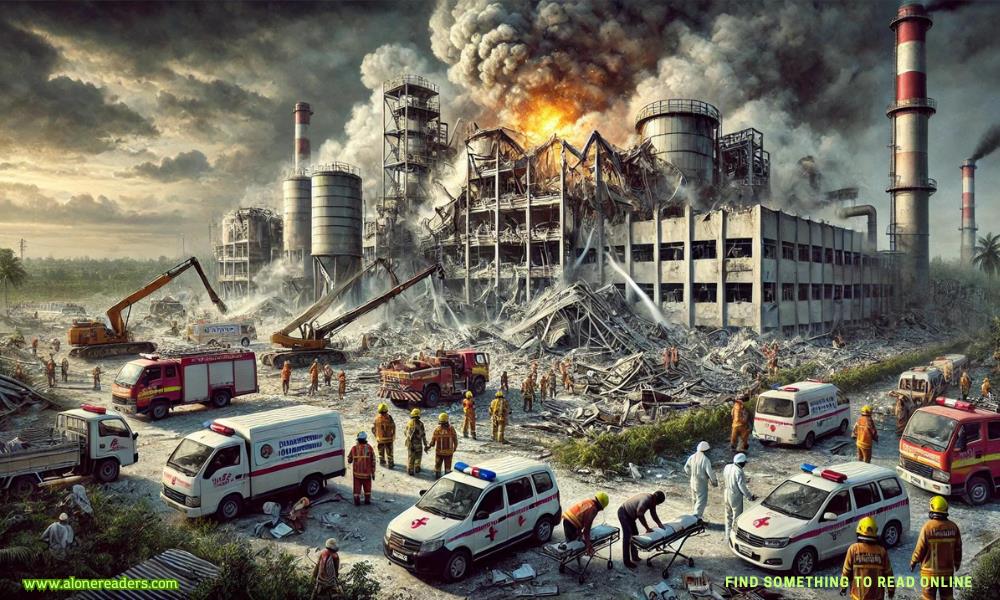
A tragic explosion at a pharmaceutical factory in Atchutapuram, located in India’s southern state of Andhra Pradesh, has sent shockwaves through the community and the country. The blast, which took place on a routine workday, resulted in the deaths of 17 workers and left dozens more injured, some critically. The factory, which specialized in the production of chemical compounds for pharmaceutical use, became the site of one of the deadliest industrial accidents in recent times. The incident has not only brought to the forefront issues regarding safety in India’s industrial sectors but also left families and communities grappling with the devastating aftermath.
The explosion occurred without warning, catching many workers off guard as they went about their daily tasks. According to initial reports, a large section of the factory was engulfed in flames shortly after the explosion, making rescue efforts extremely difficult. Emergency responders rushed to the scene, but the intense heat and fire slowed down their efforts to pull out survivors. As firefighters battled the blaze, local hospitals quickly filled with the injured, many of whom sustained severe burns and other life-threatening injuries. Eyewitness accounts from those present during the explosion describe scenes of chaos, with workers running for their lives and thick black smoke billowing from the factory.
Authorities investigating the explosion have yet to confirm the exact cause, though preliminary findings suggest that it could have been the result of a chemical reaction gone wrong. The factory’s storage and handling of volatile chemicals used in pharmaceutical production likely played a significant role in the disaster. Such chemicals require stringent safety protocols, and any failure in these protocols can lead to catastrophic outcomes. The explosion at the Atchutapuram factory raises serious concerns about the enforcement of safety regulations in India’s rapidly growing pharmaceutical sector. While India is known as a global hub for pharmaceutical production, incidents like this highlight the potential human cost when safety takes a backseat to production.
The impact of the explosion extends far beyond the immediate death toll and injuries. Many of the workers killed or injured in the blast were the sole breadwinners for their families, leaving their loved ones devastated and financially insecure. In the aftermath of the explosion, several families gathered near the factory gates, anxiously waiting for news about their missing relatives. The local government has announced compensation for the families of the deceased, but this financial assistance will hardly fill the void left by the loss of life. The tragedy has also cast a long shadow over the local community, which is tightly knit and reliant on the factory for employment. Workers are now fearful of returning to their jobs, worried about the possibility of further accidents.
In response to the disaster, there have been calls from both local officials and labor unions for stricter enforcement of safety measures in the workplace. The factory, like many others in the region, employed a large number of contract workers, many of whom were reportedly untrained in handling hazardous materials. This has raised further questions about the treatment of contract laborers in India’s industrial sector and the broader issue of worker rights. With industrial accidents on the rise across the country, there is growing pressure on both the government and companies to prioritize worker safety over profit margins.
The pharmaceutical industry in India is one of the largest in the world, supplying medications and chemical compounds to countries across the globe. However, the rapid growth of this sector has not always been accompanied by stringent safety oversight. Many factories are located in industrial hubs like Atchutapuram, where workers are exposed to dangerous chemicals and high-risk environments. While India has safety regulations in place for industrial operations, enforcement of these laws is often lax, especially in remote areas. The Atchutapuram explosion is a grim reminder that without proper safety standards, the cost of doing business can sometimes be paid in human lives.
As investigations continue into the cause of the explosion, there is a broader discussion about the need for systemic reform. Workers’ safety is paramount in industries that handle dangerous chemicals, yet many factory owners fail to implement adequate measures to protect their employees. This incident has led to a renewed focus on workplace safety in India, with advocates pushing for better training, equipment, and enforcement of existing regulations. Additionally, there is a need for better infrastructure to handle emergency situations, such as fires and explosions, so that rescue efforts are not hampered in future incidents.
The Atchutapuram explosion has also garnered international attention, as pharmaceutical companies worldwide rely on Indian suppliers for their raw materials. The incident has prompted some companies to reevaluate their sourcing strategies, ensuring that their suppliers comply with international safety standards. While this may help spur improvements in safety practices, it also raises concerns about the potential economic impact on local businesses and workers who depend on these factories for their livelihoods.
In conclusion, the explosion at the Atchutapuram pharmaceutical factory is a tragic event that underscores the importance of industrial safety. The loss of 17 lives and the injuries sustained by many others are a sobering reminder that without proper precautions, industrial operations can quickly turn deadly. As India continues to grow as an industrial power, it is essential that the safety of its workers becomes a top priority. The government, industry leaders, and labor unions must work together to prevent future tragedies and ensure that workers can carry out their jobs without fear of such devastating accidents. The aftermath of the Atchutapuram explosion will likely lead to greater scrutiny of safety practices in the pharmaceutical sector, but for the families of the victims, the pain and loss will endure long after the headlines fade.